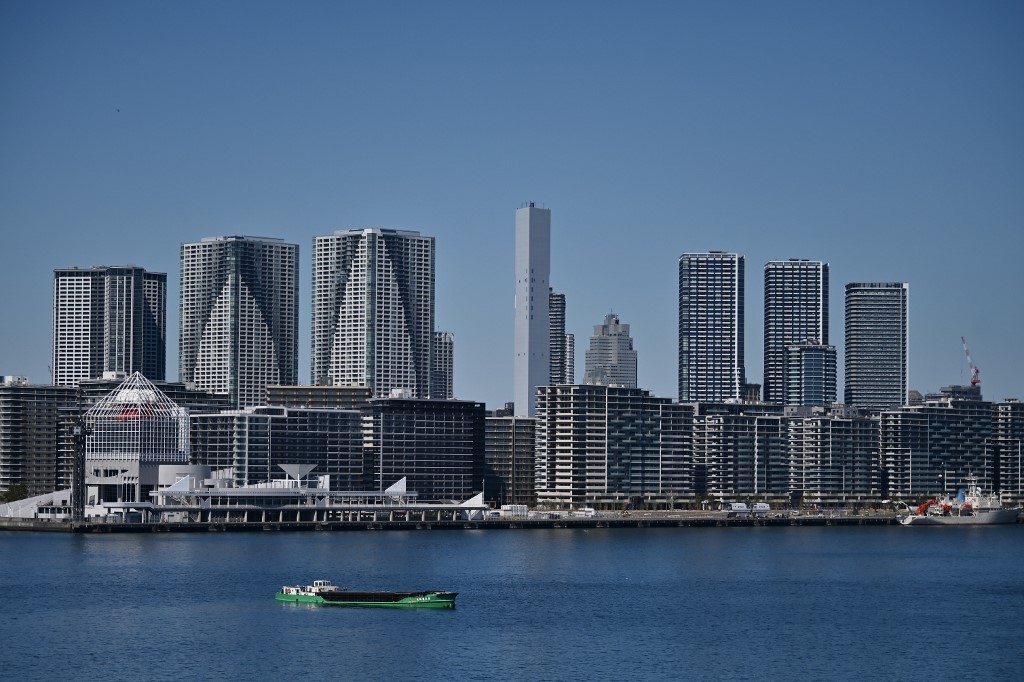A concrete problem: Olympic delay spells limbo on Athletes’ Village

Part of the Olympic village (foreground) is pictured in Tokyo on March 25, 2020, the day after the historic decision to postpone the 2020 Tokyo Olympic Games. (Photo by CHARLY TRIBALLEAU / AFP)
Hundreds of luxury apartments overlooking Tokyo Bay that were due to be converted from the Athletes’ Village have already been sold — just one of the many headaches caused by the historic postponement of the Tokyo Olympics.
Touted by developers as a “flagship neighborhood for urban lifestyles”, the buildings housing the 11,000 competitors were to be hastily repurposed into more than 4,000 condos with stunning city views, some carrying a price tag of 170 million yen ($1.5 million).
The decision to postpone the Games by up to a year has pitched buyers into uncertainty, according to Zoe Ward, director of Tokyo Property Central, with close to 900 units already snapped up.
“Even if it’s not a financial hit, it’s going to be a big inconvenience to them,” Ward told AFP.
She added that buyers would now be scouring the small print of their contracts to see if they can pull out without losing their deposits — usually around five percent.
“The wording they put in the contract is pretty vague, it normally says natural disasters or anything outside the sellers’ control so it might fall under that category,” said the property expert.
One buyer, a man in his 30s, had been planning to move into the development in March 2023 with his wife and children and told AFP there were “many, many scenarios” that could now arise.
However, he was relatively zen about the delay given the unprecedented coronavirus situation.
“I’m not so stupid as to see the coronavirus effect as being a problem on the same level as a construction defect. I would say it can’t be helped. I’m sure the selling side is facing a hard time,” said the man, who declined to be named.
‘Double whammy’
Tomohiro Makino, CEO of consulting firm Oraga Research and an expert on Japanese real estate, told AFP that developers faced a “double whammy” of a falling market generally and image problems with the Olympic Village project.
“There is a concern prices could drop. If excitement and anticipation (about the Olympics) fades away, the situation will be severe for the selling side. For now, cancellations are a critical problem for them,” said Makino.
One of the biggest draws — being part of the Olympic legacy — could now be tarnished, he added.
He said developers should have legal cover from a force majeure clause but given the high profile of the project, they may be inclined to show flexibility — especially as only a quarter of the units have been put up for sale.
“The selling side has been forced into making a tough decision,” he said.
Sellers had marketed the development, which comprises 23 tower blocks capable of housing up to 12,000 people, as “the city complex where everything begins” with views of the ocean, Tokyo Tower and the metropolis’ glittering skyline.
The 18-hectare (45 acres) plot would also feature schools, a playground, swimming pool and gym. As the apartments are renovated from elite athletes’ accommodation, they are also slightly bigger than average Tokyo flats, which tend to be on the small side.
“Looking from the sky, the new neighborhood appears like a large flag right in the middle of Tokyo. It has limitless potential as a new flagship model for urban lifestyles,” according to the promotional material.
‘Clear schedule’
The development is a joint-venture bringing together 11 of Japan’s top real estate firms.
A spokeswoman for one of the firms, Mitsui Fudosan Co, told AFP: “We are hurriedly assessing the impact of the postponement of the Olympics with companies and officials involved in the project.”
The sale of the second batch of units has been delayed from March to June or later, said another official at the company, insisting this was “due to the effect of the new coronavirus. It’s nothing to do with a possible postponement of the Olympics”.
Ward said that while uncertainty hung over both buyers and developers, the situation was better than the limbo they faced before the International Olympic Committee and Japan’s unprecedented decision.
“Once the government gets a clear schedule (for the Games to go ahead), then the project will start doing active sales again. Up until (the night before the decision), I think it was worse for buyers because no one knew what they were doing,” she said.
“I feel like it’s good news because cancellation would be far worse for everyone’s attitude and general feeling. I think an extension is the best thing we could have. Going through with it would be terrible and canceling it would be worse.”